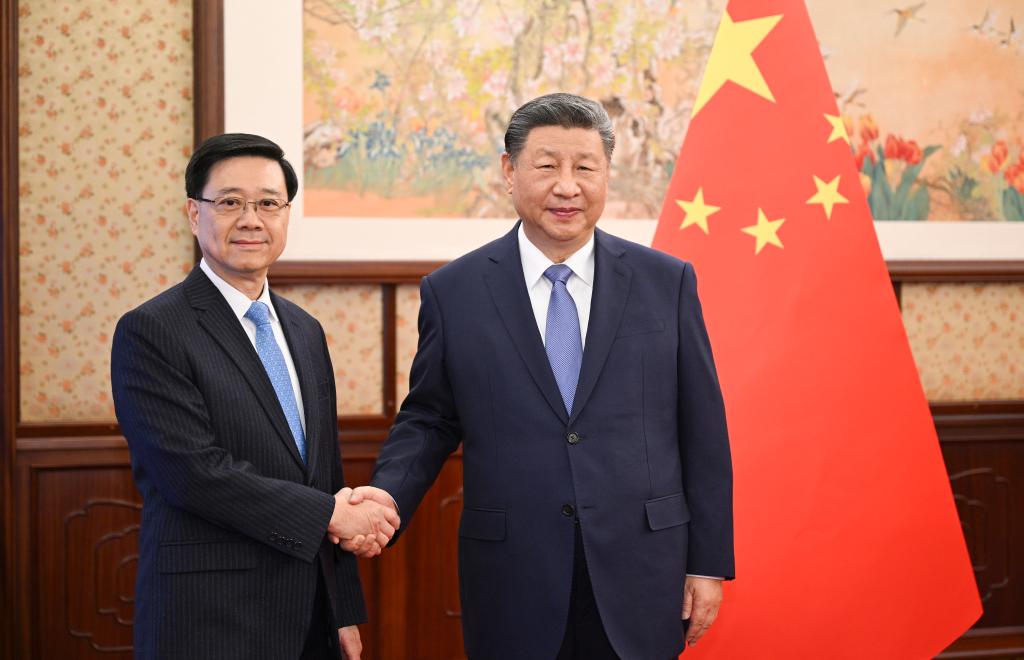President reaffirms support for Hong Kong in forging ahead with reform to drive future growth

President Xi Jinping reaffirmed Beijing’s full backing to Chief Executive John Lee Ka-chiu and the Hong Kong Special Administrative Region government in forging ahead with reform, aligning with national strategies, and shaping the city’s new strengths and momentum for growth.
The president offered full recognition to Lee and the SAR government for their work over the past year, while meeting with him at the Zhongnanhai leadership compound in Beijing on Dec 13.
Lee was on a duty visit to the capital to report on the SAR’s latest economic, social, and political situation, as well as the work of the government.
Xi commended the SAR government, led by Lee, on assuming its due responsibilities, staying pragmatic and enterprising, and achieving the historic completion of the legislative work on Article 23 of the Basic Law.
He also praised the Hong Kong administration’s efforts in focusing on economic growth, striving to address public well-being issues such as housing and healthcare, and bolstering international exchanges and cooperation.
Xi mentioned the third plenary session of the 20th Central Committee of the Communist Party of China, which emphasized the need to give play to the institutional strengths of “one country, two systems”.
Hong Kong’s development is now presented with new historic opportunities, he said.
Xi reiterated the commitment from the central government in fully, faithfully and resolutely implementing the policy of “one country, two systems”.
He encouraged Lee and the SAR government to unite and lead the various sectors of society to enable the region’s transition from governance to prosperity and contribute greater efforts to the city’s prosperity and stability.
According to the SAR government, Hong Kong’s GDP grew by 2.6 percent year-on-year in the first three quarters of 2024. The city’s unemployment rate stayed low at 3.1 percent during the August-October period.
Lau Siu-kai, a consultant with the Chinese Association of Hong Kong and Macao Studies, a Beijing-based think tank, said that the SAR government has actively driven Hong Kong’s industrial shift, backing emerging sectors such as innovation and technology, over the past year.
The city also deepened its integration into national development, while a notable rise in the supply of public housing and enhanced living conditions for residents of subdivided units contributed to better public well-being, Lau said.
Going forward, Lau urged the bolstering of government leadership in economic development, particularly in fostering new industries.
Guo Wanda, executive vice-president of the Shenzhen-based China Development Institute and vice-chairman of the Chinese Association of Hong Kong and Macao Studies, said that Hong Kong’s steady progress in its economy and livelihoods over the past year has met expectations for growth.
He urged Hong Kong to seize opportunities arising from the nation’s supportive policies, especially in the tourism and retail sectors, through measures such as increasing the duty-free allowance and the expansion of the multiple-entry individual visit scheme.
In the city’s traditional industries such as finance, trade, and shipping, Hong Kong must diversify into new ventures, he said.
“These shifts in traditionally core industries could also serve as catalysts for emerging industries. Notably, the city’s financial market should enhance support for startups and innovative ventures to bolster its drive toward scientific and technological development,” he said.
Contact the writers at xuwei@chinadaily.com.cn


